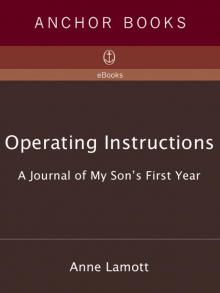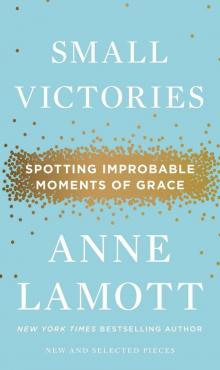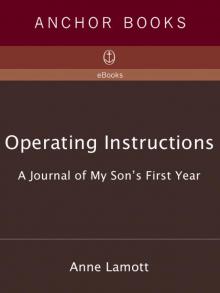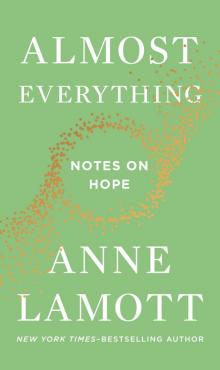- Home
- Anne Lamott
Grace (Eventually) Page 2
Grace (Eventually) Read online
Page 2
Ty still hadn’t come back by the time I finished reading the book at seven, so I went to the main road in Bolinas to hitchhike home. I ended up at the bar. It would be ten more years before I stopped drinking, twenty years ago today. But I remember standing there at dusk with my thumb out, euphoric and exhausted as if I’d been at the beach all day, then taken a long, hot shower to wash off all the sand.
Dance Class
See how the fearful chandelier
Trembles above you
Each time you open your mouth
To sing. Sing.
—DONALD JUSTICE
Ski Patrol
Not too long ago, I was skiing in the mountains where my son, Sam, and I spend a weekend most winters. Nowadays, he instantly disappears with the hordes of snowboarders. I believe he is somewhat embarrassed to be seen with me: once, standing next to him and his friend at the bottom of a hill, I fell over for no reason. And in fact, the very first time we went skiing together, I skied in a strangely slow, inexorable path for a hundred feet or so, straight into a huge net at the bottom of the slopes, erected to protect the small Ski Bear children from being crushed. Then I got tangled up in it, like a fish.
After Sam disappears, I usually take the chairlift to the top of the pony slope for a couple of runs, which anyone can manage. And I triumph. I roar down the slight incline, pretending to be an Olympic skier. Filled with confidence, I try the easiest intermediate slope, where I mostly fall or slide down on my butt for the first run, and then have a few extended runs of four or five minutes where I am actually skiing. By my second run down an intermediate slope, I am on my feet almost the whole time, skiing triumphantly for America.
But this time, as the chairlift carried me to the top of the intermediate slope, which I had just skied down, I experienced a moment’s confusion, born of hormones, high altitude, and a light snow falling. I suddenly could not remember whether the stop we were approaching was the same one I had just skied down from. The chair slowed and lowered for us to disembark, and my seatmate got off and zipped away like a swallow, while I sat there torn between wanting to get off and thinking that mine was the next stop.
The chair jerked forward and resumed its ascent. I looked around for landmarks but saw only brightly colored skiers in clusters, and I was pretty sure that this was not the right stop…until a second later, when I realized I was mistaken—it was the right stop. By then, the chair was four or five feet off the ground and rising. But I did not let this stop me. I took a long, deep breath, wriggled to the edge of the chair, and flung myself off into the snow—flung myself, the way stuntmen fling themselves onto the backs of speeding trains, or a clown flings himself from a bucking bronco, mugging bug-eyed for the crowd.
I estimate that I was five or six feet off the ground for the timeless instant of eternity before I crashed down into the snow. I landed hard, proving the theory of gravity once and for all. I was somehow still on my skis, for a moment, until I fell over.
I do not imagine anyone had seen anything like this before, someone hurtling into outer space with such force, from such a low starting point. I felt like Icarus, near death in the snow, with melting skis instead of wings.
I was immediately aware of two things: that I was not badly hurt, and that most people were pretending not to have noticed, out of kindness, or horror, or mortification. I am ever my mother’s daughter, and so my first impulse was to smile with confidence to the few who were watching, wave like a politician campaigning from a rarely used horizontal position.
“I’m okay,” I said to two pretty women who came over and offered to pull me up. I continued to wave nonchalantly, as if this sort of silly thing happened to me all the time. I told them that I just needed to catch my breath. They made sympathetic cooing sounds, and skied away. I sat up and leaned back on my hands in the snow.
By the time I finally stood up, my hands were frozen. I was winded, ashamed, confused, bruised—grateful only that Sam hadn’t seen me. He’d have died. He would have stabbed himself repeatedly in the head with his ski pole.
Just when I thought things couldn’t get much worse, nausea struck, wave after wave, like morning sickness, and I thought, I’m going to throw up in the snow! Ladies and gentlemen, now for my next trick…I pretended to pinch my nostrils against the cold, but was actually pressing my hand to my mouth to hold back the tide. My head spun, and I prayed, Help me, Jesus, help me, the way a very old woman at my church named Mary used to pray at her most afraid and delirious, right in the middle of anything—sermons, songs: “I know my change is gonna come, but touch me now, Lord.”
I don’t know how long I stood there with my hand clamped to my mouth, only my poles and a frayed, consignment-store faith to support me. All I knew was that help is always on the way, a hundred percent of the time. Rumi said, “Someone fills the cup in front of us.” I know that when I call out, God will be near, and hear, and help eventually. Of course, it is the “eventually” that throws one into despair. For instance, even now, I know America will be restored again, eventually, although it is hard to envision this at the moment, and it could take a century or more for the nation and the world to recover from the George W. Bush years. But they will. God always hears our cries, and helps, and it’s always a surprise to see what form God will take on earth: in the old joke, a man whose plane crashed in the tundra bitterly tells a bartender that God forsook him—that he waited in vain for divine intervention, and would have died in the snow…if it hadn’t been for some fucking Eskimos who came by. So maybe a tall, strong man with a medical toboggan would be by soon, or the two pretty women, or Jesus in earmuffs.
Instead, a short, plump woman pulled up on skis a few minutes later. She was wearing an orange cap and an official jacket from the ski resort.
“I think I’m going to throw up,” I said, so she wouldn’t get too close.
“Well, then, let’s just stand here a moment,” she said. She had acne and chapped cheeks, and small brown eyes.
“I think I might need help,” I said, which is something I force myself to say every few years.
“You landed so hard. I saw you from up above.”
I shook my head, bewildered, on the verge of tears. “Are you on the ski patrol?” I asked.
“Sort of. I’m here to help in non-emergency situations like this. Why don’t you come with me.” She stepped out of her skis and stood on my bindings so that I could step out of mine. We picked up our skis and I trudged after her through the snow.
We walked to a wooden ten-by-ten shack away from the lift and went inside. It held two long benches, a folding chair, and shelves laden with first-aid equipment, bottles of water, used coffee cups, a walkie-talkie; and it was warm from a kerosene heater. There were two shabby windows, through which you could see snowy pine trees outside. The woman poured me a miniature Dixie cup of water, but my face was so cold that I couldn’t get my lips to work, and I dribbled water down my front like an aged, numbed-up woman at the dentist’s.
She took the cup away from me. “Let’s take off your gloves first,” she said, and pulled them off, as gently as if they were mittens connected inside my jacket sleeves with a string.
She laid my gloves on the chair near the heater and pulled off her own. “Mine are nice and toasty,” she said. “You can wear them for a while, until yours warm up. I’ll be back soon—there are only a couple of us working this spot today.” She went outside.
After a while, I stretched out on one of the benches and closed my eyes. The kerosene smelled like lacquer, and I kept feeling waves of nausea. My bones were cold. I could isolate the icy scent of pine trees that sneaked through the walls. Sometimes grace is a ribbon of mountain air that gets in through the cracks.
I practiced concentrating between each wave of nausea, the way I did when I was in labor, savoring ice chips and apple juice between contractions. Miles from home, holed up deeply alone in a smelly hut, I had the old, familiar feelings of separation: from myself, from God, and from the
happy, pretty people outside.
I thought of the woman from the ski patrol, with her small brown eyes. She looked like the monk seals that swim ashore in Hawaii to rest on the sand. The adult seals are six and seven feet long, and they all look like Charles Laughton. The newest tourists on the beach think they are dying and need to be rescued, but anyone who has been there even a day knows that they come onshore to rest. Pool workers from the beachside resorts always arrive, with yellow safety tape and traffic cones, to rope off a space for the seals to rest in. The first time I came upon one in the sand, I thought it was trying to make eye contact with me—I was its last, best hope of being saved. It had sand around its eyes and lots of shark scars. My guy Rory, who surfs in Hawaii every year, laughed and explained that the seals are perfectly fine, and when they are rested, they waddle back to the ocean.
This is how I feel about the world much of the time, when I am not feeling too far gone: Things are how they are supposed to be, all evidence to the contrary. Life swims, lumbers across the sand, rests; lumbers, swims, rests.
I lay there on the bench immobilized. If I were a monk seal, I could have waddled up into a sitting position, slid off the bench, and pulled myself by my flippers back into the ocean. Rory once saw a mother monk seal teaching her pup how to rest by swimming up onto the sand for a while before slipping back into the waves. The two of them practiced over and over, then disappeared into the water. Remembering this made me miss Sam terribly. I felt discarded, and I needed for time to pass more quickly. I would be fine with life’s contractions if they would simply pass when I am ready for them to, so I can be okay again and remember what, after all, I’m doing in labor. Being human can be so dispiriting. It is a real stretch for me a lot of the time.
I put my nose to a crack in the wall so I could smell the pine.
I couldn’t wait any longer for the ski patrol woman to come back. Where was she? She’d said. She was my only real friend, and I was such a mess. Her voice was gentle and kind—“O that today you would hearken to His voice,” the psalmist wrote, and “harden not your hearts.” Okay, fine, I said to God, and then noticed that I was much less of a frozen mess than I’d been earlier. This was a lot. I could have sat up, but I wanted the ski patrol person to see the full extent of my suffering—if she ever in fact returned.
I thought of the people I know from church and political circles who are doing a kind of psychic ski patrol in the world, noticing when people are in trouble, refusing to look away, offering an ear and their own warm gloves to wear.
Twenty minutes later, my ski patrol woman did come back, rubbing her bare hands together. “How you doing?” she asked. At first the enthusiasm in her voice worried me, because she sounded as if we might now move on to calisthenics. Then I could tell that she knew I was fine, better, rested. I was peaceful: she was my own private pool-worker, my own mother seal. I sat up and breathed in the fresh air from the open door.
She gave me another Dixie cup of water, and I hoisted it Germanically.
She walked over to the heater and checked my gloves. “They’re all ready to wear again if you’ll give me mine back.”
I stood up. I felt like my old self, which is to say creaky but okay.
“I’d take the chair down,” she said. “Unless you really want to ski.”
I really wanted to ski. I’d already had one great run down this slope.
She made a huge fuss over me when I left, as if I’d been in an avalanche. I pulled on my gloves and headed out onto the huge white ocean of ice. I glided and fell and got back up and skied little by little, the very best I could, all the way down the mountain.
Wailing Wall
There was so much bad news this winter that many of us were left feeling pummeled and disturbed. Parents and relatives died, kids got into much more serious trouble, and way too many friends got a bad diagnosis. What can you say when people call with a scary or heartbreaking prognosis? You say that we don’t have to live alone with our worries and losses, that all the people in their tide pool will be there for them. You say that it totally sucks, and that grace abounds. You can’t say that things will be fine down the road, because that holds the spiritual authority of someone chirping “No worries!” at Starbucks, or my favorite, “It’s all good!” at the market. It’s so not all good. And I’m worried sick.
It’s fine to know, but not to say, that in some inadequate and surprising ways, things will be semi-okay, the way wild flowers spring up at the rocky dirt-line where the open-space meadow meets the road, where the ground is so mean. Just as it’s fine to know but not say that anger is good, a bad attitude is excellent, and the medicinal powers of shouting and complaining cannot be overestimated.
One intensely green spring morning, I prepared to teach children at my church about the Wailing Wall in Jerusalem. I had been assigned to teach the youngest children, who have the attention span of squirrel monkeys, but at least I had good curriculum materials and my friend Neshama to help.
I’d been pumped up about the lesson the night before, when I saw an art project suggested in the curriculum materials that involved building a paper Wailing Wall with students, to teach them about pouring one’s heart out to God and about letting go. I’d also printed images from the Internet of men clustered at the wall, crowds milling around nearby, harder-to-find shots of women at the wall, multiple copies of one block of stone, and a picture of a young boy and his father in yarmulkes, pushing prayers written on paper into cracks in the wall. This is something I do all the time, shove bits of paper with prayers and names on them into desk drawers, little boxes, my glove compartment. I’ve found that when you give up on using your mind to solve a problem—which your mind is holding on to like a dog with a chew toy—writing it down helps turn off the terrible alertness. When you’re not siphoned into the black hole of worried control and playing fretful Savior, turning the problem over to God or the elves in the glove compartment harnesses something in the universe that is bigger than you, and that just might work.
So I started off class as I always do, by separating the known offenders, two brothers who are four and five and from whom one can expect more or less muffled explosions. We had only boys that day—the brothers, two six-year-olds, and a three-year-old wild man we’ll call Frederick—and Frederick’s mother.
Each boy reminded me of Sam at different ages, and as he still is: goggle-eyed and watchful at three; at four, newly articulate, like the younger of the two brothers, his eyes big-mammal wide and brown. Sam was still cuddly at that age, more like a baby than a kid, still seeking comforting things—me, for instance. At five, he was like the older of the brothers; he grew more wiry, was prone to anger, and since other children messed with him more, he could no longer afford to space out. He no longer got distracted by his navel, no longer twisted his fingers into his forehead. He and his friends were learning to pick on one another and play the social angle. At five, there’s a gap between who you want to be and who you are. You’re still pretty small, not able to read or write too well; I know it was scary for Sam to think that he would never learn. Six-year-olds, like the boys visiting, seemed as worldly and independent as bachelors to Sam when he was five. Six-year-olds could ride their bikes to school, and they had a cover—mannerisms to mask how needy and angry and afraid life made them feel much of the time. They were making images of themselves. It’s scary when the self divides into one being who will be more noticed and admired, and another, worried person who gapes out at the world from inside.
I welcomed everyone, made introductions, and then launched into Soft Body. We clenched our fists, our faces, and scrunched our shoulders up to our ears, like Nixon. We held that for a minute, grimacing, and at the count of three, we released. Then we did it again. It’s a tool for the children, the tool of having their bodies be quiet for a few minutes. Afterward they revert to form—bouncing in their seats, poking, blurting, sliding down wide-eyed like corpses beneath the table. But when I said, “Butts on chairs! Now!” the
y obeyed. Except for Frederick, who shimmied and babbled.
His mother looked as if she could use a nice refreshing martini.
Next, as always, we did Loved and Chosen.
I sat on the couch and glanced slowly around in a goofy, menacing way, and then said, “Is anyone here wearing a blue sweatshirt with Pokémon on it?” The four-year-old looked down at his chest, astonished to discover that he matched this description—like, What are the odds? He raised his hand. “Come over here to the couch,” I said. “You are so loved, and so chosen.” He clutched at himself like a beauty pageant finalist. Then I asked if anyone that day was wearing green socks with brown shoes, a Giants cap, an argyle vest? Each of them turned out to be loved and chosen, which does not happen so often. Even Neshama—Anyone in red shoes today?—leapt toward the couch with relief.
My Jesuit friend Tom once told me that this is a good exercise because in truth, everyone is loved and chosen, even Dick Cheney, even Saddam Hussein. That God loves them, because God loves.
“This—more than anything else—does not make sense to me,” I said.
“Because you are a little angry,” Tom explained. “But when people die, they are forgiven and welcomed home. Then God will help them figure out how to clean up the disgusting messes they have made. God has skills and ideas on how to do this.”
After Loved and Chosen, I did a shakedown and made them hand over everything in their pockets that might distract them—or me. We lit a candle: Let there be light, warmth, and all that. No harm in this, right? No worries! We bowed our heads in prayer, our hands to our chins, because in all pictures since time began, good children pray in this pose.

 Rosie
Rosie Crooked Little Heart
Crooked Little Heart Bird by Bird: Some Instructions on Writing and Life
Bird by Bird: Some Instructions on Writing and Life Operating Instructions: A Journal of My Son's First Year
Operating Instructions: A Journal of My Son's First Year Plan B: Further Thoughts on Faith
Plan B: Further Thoughts on Faith Small Victories: Spotting Improbable Moments of Grace
Small Victories: Spotting Improbable Moments of Grace Imperfect Birds
Imperfect Birds All New People
All New People Grace (Eventually)
Grace (Eventually) Hallelujah Anyway
Hallelujah Anyway Operating Instructions
Operating Instructions Almost Everything
Almost Everything Blue Shoe
Blue Shoe Plan B
Plan B Bird by Bird
Bird by Bird